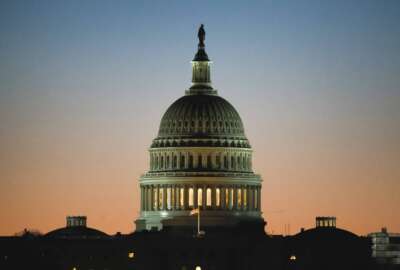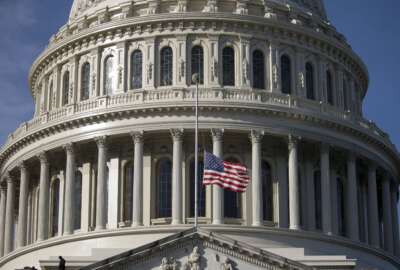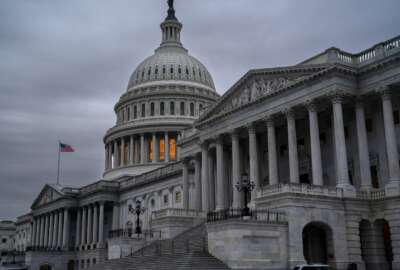
With Spring Break over, Capitol Hill should be hopping
The House and Senate are coming back to the Hill after a two-week spring hiatus.
The House and Senate are coming back to the Hill after a two-week spring hiatus. The Senate will have a couple of members return from their own breaks, while some House reps will be taking their work on the road, for what is sure to be a hearing with a lot of eyeballs on it. To find out more of what’s ahead, The Federal Drive with Tom Temin spoke with Bloomberg Government’s Deputy News Director Loren Duggan.
Interview transcript:
Loren Duggan Now that they’re back from this two week spring recess, which is tradition around the holidays, they really are going to have to focus in on this question, because there’s not a lot of time left before they have to do something, whether it’s short-term or long-term and what rates with it, those are going to be the big questions. So what we’re going to see this morning, is Kevin McCarthy (R-Calif.) go to Wall Street and address the New York Stock Exchange about the economy and things that are on his mind. I think trying to lay the groundwork here for what he and his caucus are going to do as they move into these negotiations. There really haven’t been negotiations. There’s been a meeting between President Biden and Speaker McCarthy. There were the scenes at the State of the Union where they talked about some things there, and there’s been some papers exchanged, whether it’s the big budget request or the letter McCarthy sent. But negotiations have to happen, both internally and across Pennsylvania Avenue. So we’ll be looking over the next weeks and months to see what happens here, because the closer we get to the summer, the more the pressure is really going to ratchet up.
Eric White And speaking of cross branch relations, lawmakers are also going to be talking about whether or not they want to override a veto of the president, invoking the Congressional Review Act to block the Biden administration’s rule defining waters subject to environmental regulation. What is going to be happening there?
Loren Duggan Yes, this is one of the the second rule that Congress has tried to overturn using this. Now, even though the Democrats have control of the Senate, enough Democrats have sided with Republicans to get those pieces of legislation through the two chambers. President Biden, understandably, having had his administration issued this rule, vetoed the legislation that would cancel it. So we will see a vote in the House. It’s unlikely to be successful, because it was nowhere near a two-thirds majority in that chamber for that bill. So what will likely happen is that’ll be the end of it. So I don’t think it’s the end of Congress trying to deal with this rule, it’s also tied up in the courts. So this will be an ongoing discussion about this piece of policy. But in terms of using the Congressional Review Act to cancel the rule, that’s not going to go any further than it already has.
Eric White All right. And all eyes may not be on D.C. when Congress returns. It turns out there’s going to be a congressional hearing that will be off campus and it’s going to be held in Manhattan. Related to all the stuff between New York D.A. Alvin Bragg (D-N.Y.) And former President Donald Trump (R-N.Y.). Obviously, there is a lot going on there. But I just want to talk to you a little bit about the history of these off campus congressional hearings that happen from time to time. What do you make of it?
Loren Duggan So field hearings, as they call them, are somewhat common, but they tend to not be very high profile. Maybe it’s a way for a vulnerable member to convene something in their district or their state and show that they’re working and bringing people to Washington and getting the views outside of Washington and bringing them back to D.C. What House Republicans have done is use these, and try to make them very high profile. Whether it’s a trip to the border, as they’ve done a couple of times, including to talk about general border policy, how the Border Patrol is doing, or this one today, which will be very much focused on Alvin Bragg, the D.A. in Manhattan. So it’s a way for Congress to extend its reach and use its convening power in different places. And obviously, they’ll try to get the media to pay attention to what they’re doing by being in a different place, maybe with some different visuals. So this is definitely part of the playbook I think we’ve seen, and will continue to see, as House Republicans push their oversight agenda, even as maybe some of their legislative priorities are stymied just by the dynamics of Congress versus the president right now.
Eric White Well, I’d say it’s mission accomplished and getting people’s attention. So I don’t think you’ll have any shortage of cameras there. Let’s talk about the Senate. We have two lawmakers. One longstanding, and one who is just getting his feet wet that are going to be returning when this session starts. And also, one who may be on the outs with her own party. What can you tell me about Mitch McConnell (R-Ala.), John Fetterman (D-Pa.) and Dianne Feinstein (D-Calif.)?
Loren Duggan So. Sure. John Fetterman, who’s been out for a while dealing with inpatient treatment for clinical depression, is back. He did some events last week. He’s going to convene a hearing this week as a brand new subcommittee chairman. So he seems to be back and running toward the job. In terms of Mitch McConnell, he’s been out for a shorter amount of time but was sidelined by an injury he sustained at a dinner in Washington last month. So he’s gone through some inpatient rehab, spent time at home. He says he’s coming back today and he’ll be part of the big discussions happening, too, because as a leader of the Senate Republican caucus, he has a big role there. You mentioned Dianne Feinstein, and this situation does feel trickier. She’s been out for quite a while, recovering from the shingles. The idea had been that she would return for this April session, but she is unable to do so and the advice of her doctors. There was pressure last week from Ro Khanna (D-Calif.) for her to retire. She’s not running for reelection in 2024, but there’s still a good chunk of two years left for that seat. And Democrats very much need that seat to get their agenda through. One thing she’s asked is to be temporarily taken off the Senate Judiciary, because her absence has been felt because they haven’t been able to get judicial nominations through that committee and to the floor. And they want that pipeline to keep going, because it’s a very important thing for Democrats in the administration and in the Senate. So I think she will face continued calls to retire at this point. But we’ll see what happens with this replacing her on the Judiciary Committee, because it’s not just a snap your fingers and make it happen. There may be some negotiations, republicans may be able to slow that down. So this will be a dynamic we’ll watch very closely as the Senate gets back to town and see how they handle this.
Eric White Yeah. Could this spark a debate that many have been calling for a while now, especially in the Senate? You talk about Mitch McConnell returning from an injury, and he’s been in there for a while, he’s not getting any younger. Does the idea of getting some new blood in there for both parties, so to speak, do you see anything like that maybe cropping up because of these situations that have arisen?
Loren Duggan Well, term limits get bandied about every so often. I feel like every decade or so there’s a real push to maybe have that discussion, But it tends to be unpopular a lot of times with the people who would be affected by it. So voters have returned these people time and time again. Dianne Feinstein won four and a half years ago, Mitch McConnell more recently. And so, if voters keep sending them, they’re going to be there. And there really aren’t mechanisms to remove somebody, other than them retiring or resigning or you can expel a member, I suppose. But that’s a pretty bold, brash action that people would be reluctant to do. So I think there’s discussions will be had about that and it’s certainly brought to light in these examples and in some others from the recent past where people did seem to be declining on the job. And how do you deal with that? Especially when you have a 51-49 chamber where every vote is so precious and can really affect things when they’re not there.
Eric White And obviously, I imagine both chambers will be discussing the big news at the end of last week, which is the discovery of the leak or the person responsible for the massive leak in the Defense Department. What are you hearing on the Hill from that? Senators are poised to get a briefing this week on that subject, where they’ll get to hear directly from administration officials about what happened, what the depth of the information was that was in this document beyond what you can already glean from news reports. They’ll get it behind closed doors and probably have a frank conversation. I think they’re in the information gathering stage now, and we’ll see whether that yields some sort of talk of legislation or greater oversight, what it means for people having access to this information. But I think, when they’re back in town to talk about it, I would expect there to be more reaction now that they’re going to be back in Washington and can really get in front of the cameras, get with each other and talk about it. So I could see this pop up in a number of different areas, because there are so many hearings going on with officials that there will be opportunities to ask that in open session and then behind closed doors where the real discussions can be had.
Copyright © 2025 Federal News Network. All rights reserved. This website is not intended for users located within the European Economic Area.
Tom Temin is host of the Federal Drive and has been providing insight on federal technology and management issues for more than 30 years.
Follow @tteminWFED





